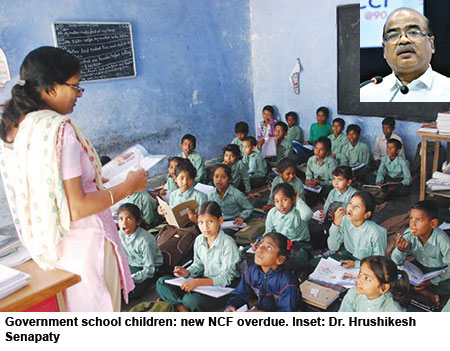
The top priorities of the new Union minister of human resource development (aka education) — the betting is that incumbent HRD minister Prakash Javadekar will retain this portfolio — are likely to be release of the New Education Policy (NEP) promised in the 2014 election manifesto of the BJP (which has been returned to power at the Centre with an even larger majority than in 2014) and formulation of a National Curriculum Framework (NCF) 2020.
Last month (April) Dr. Hrushikesh Senapaty, chairman of the National Council of Educational Research and Training (NCERT, estb.1961), also the country’s largest publisher of school textbooks which will lead this mammoth exercise, confirmed that the preliminary work on reviewing NCF 2005 has begun.
This is indeed a mammoth exercise. Formulation of NCF 2005 required a mountain of labour spread over ten months of 21 national focus groups supervised by a National Steering Committee chaired by well-known scientist and former chairman of the University Grants Commission Prof. Yash Pal and comprising 35 highly-respected professors, NGO leaders, school teachers and intellectuals from across the country. It edited, abridged and incorporated the recommendations of the 21 focus groups into the NCF 2005 report which was duly approved by CABE (Central Advisory Board of Education) and the HRD ministry. The four “guiding principles” of NCF 2005 were “connecting knowledge to life outside the school, ensuring that learning is shifted away from rote methods, enriching the curriculum to provide for overall development of children rather than remain textbook centric, and making examinations more flexible and integrated with classroom life”. Therefore the expectation is that formulating NCF 2020 is likely take more than a year.
The National Curriculum Framework document published every decade is important because it provides guidelines or a roadmap to all 33 of India’s school examination boards on ways and means to achieve desirable learning outcomes in K-12 education. The processes of syllabus formulation, curriculum design, textbooks writing, pedagogies and teaching practices are shaped by NCF.
According to Senapaty, this time round NCF 2020 will highlight the importance of new IT-driven pedagogies and experiential learning. “Memory driven rote learning is obsolete, therefore, the objective of the new NCF will be a focus on developing the critical thinking and problem-solving experiential learning skills of children in our schools,” said Senapaty, addressing the media on May 15. Already NCERT has received over 100,000 suggestions from 72,000 students, parents, teachers and others on ways and means to improve school textbooks.
With the long-delayed NEP based on the recommendations of the Kasturirangan Committee reportedly ready after the report of the high-powered T.S.R. Subramanian Committee (2016) was rejected by the BJP/NDA government and transformed into an ‘input’ for a new committee chaired by space scientist K. Kasturirangan and the NCF slated for next year, fears of a renewed attempt to “saffronise” school education have been aroused again in the academy.
It is pertinent to recall that when the BJP first came to power in 1999, it had made no secret of its intent to rewrite history texts. According to some critics of the BJP during the past five years of the BJP/NDA rule at the Centre under the guise of syllabus load reduction some 15 percent of social sciences and history content, which glorified Mughal and post-independence Congress party rule, has been excised from social science and history textbooks to fit in with the ideological predilections of the BJP. Therefore formulation of NCF 2020 is likely to be closely monitored by the liberal academy.
Be that as it may, a new NCF is overdue as the teaching-learning paradigm has experienced dramatic change during the past 15 years. Students are no longer information gatherers but need help in deciphering huge volumes of information available to them at the click of a mouse. Likewise, teachers have to learn new pedagogies and processes to engage with ‘digital native’ children in their classrooms.
“The skillsets that contemporary teachers need are entirely different from what they were taught in their B.Ed courses. Therefore, a major teacher training and development effort is required. Unless teachers are prepared to deliver the objectives of the new NCF, it won’t realise its goals,” says Arunabh Singh, an education management alum of Kings College, London and director of the CBSE-affiliated Nehru World School, Ghaziabad.
This is prophetic advice. Because teacher development remained an ignored priority, NCF 2005 has remained a dead document of pious intentions.
Also Read:Delhi: Reopening complications
